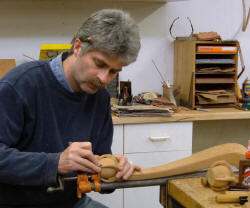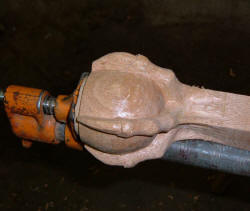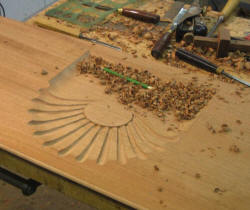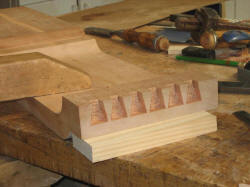As the last of the Newport cabinetmakers (so far), Jeffrey Greene takes the work of continuing the tradition of Goddard and Townsend craftsmanship seriously. The craftsmanship and authenticity of these pieces are important.
The Goddard and
Townsend cabinetmakers were renowned for their exemplary craftsmanship.
There is only one way to continue that tradition, and that is to follow
their 18th-century shop practices and do each step by hand.
Surfaces are shaped, planed and scraped by hand, all dovetails are
marked, cut, and fitted by hand, and all carving is done by hand, with
mallet and chisel. It is laborious, but there is not a modern method
that can achieve the detail these pieces require. There are plenty of
people willing to cut corners and Greene’s work stands out because he
does not.
Authenticity
means accuracy in detail as well as overall design. The Newport
craftsmen of the 18th century used methods of construction
that were unique to Newport and the individual makers. To work in their
tradition requires that cases and drawers be constructed in the original
Newport manner, and that their individual styles of joinery and carving
be followed. To abandon the Newport construction methods and replace
them with 21st-century construction would greatly compromise
these pieces. There is more than enough manufactured furniture available
already.
The 18th-century
Newport makers were excellent designers as well as craftsmen, and their
work is cherished for its exceptional proportion and line. Continuing
that tradition requires seeing through their eye and understanding their
sense of design. Greene isn’t interested in making adaptations or
variations of the original designs.
Achieving the presence of a great original can be achieved only by strict attention to craftsmanship and authenticity. Jeffrey Greene’s body of work is extensive, and in this era of mass production, it’s difficult for many people to believe this level of handcraftsmanship continues. Whether driven by a devotion to craft or a reverence for great furniture, his purpose is to keep alive Newport’s very bright place in the history of American decorative arts.
photos (from top)
1. Jeffrey Greene carving open the talons on a Goddard open-talon ball and claw foot
2. Goddard ball and claw foot, rough-carved to shape. The foot, in its final form, requires a full day to carve.
3. Beginning the carving for a center concave shell for the lid of a John Townsend block-front desk.
4. The carved shell showing the center palmette and incised volutes. The lid of this desk, with three Townsend shells, requires over a full week to build and carve.
5. Dovetail pins cut in the drawer front of a Goddard block-front desk.




